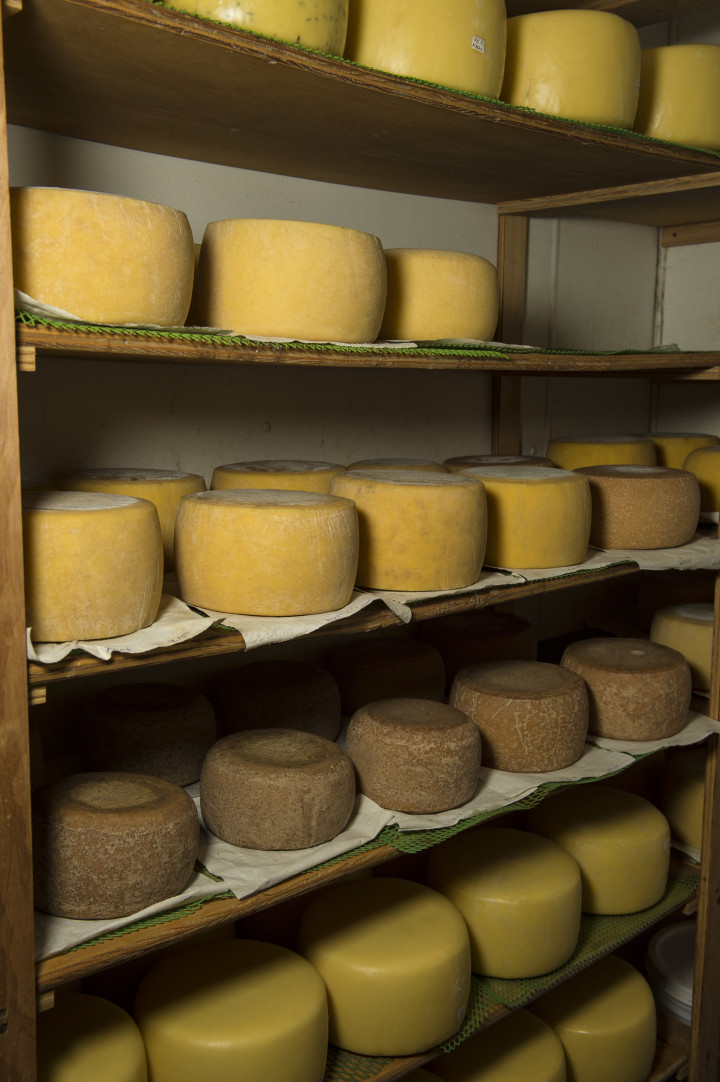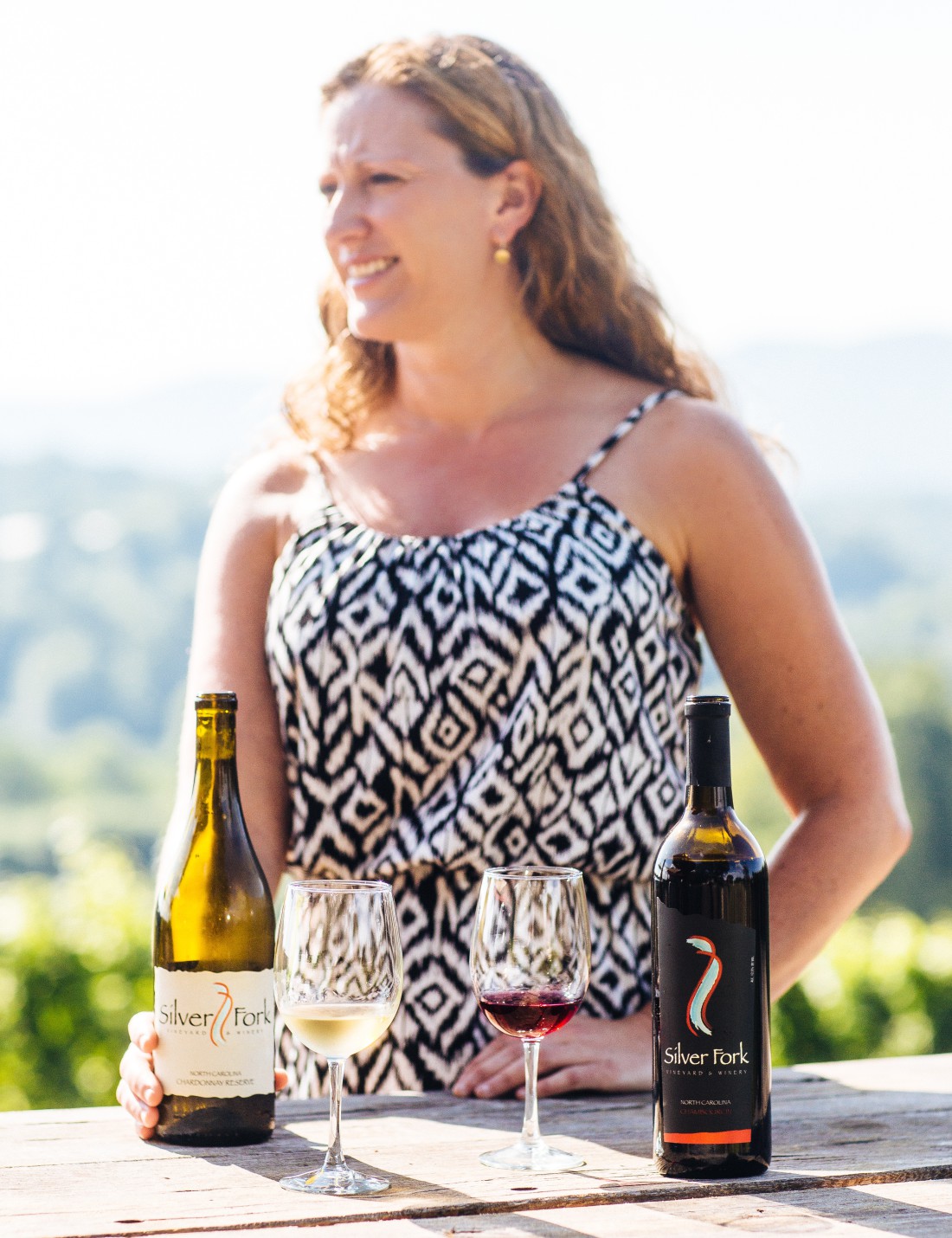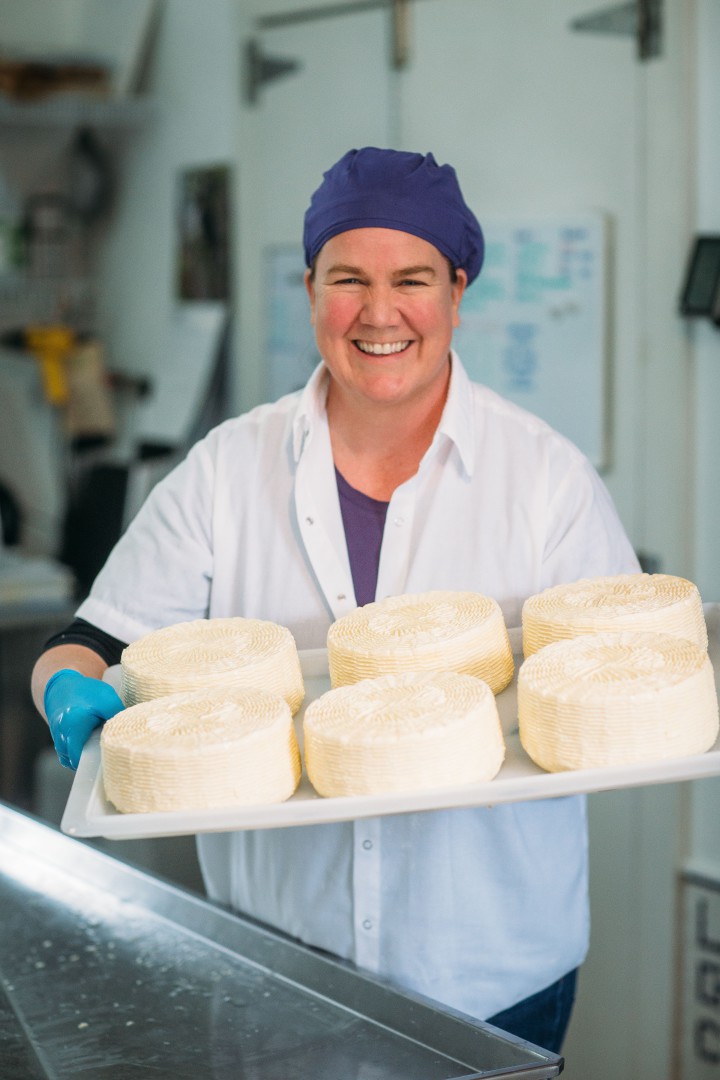Tucked away in the valleys or sprawled across the hillsides, mom-and-pop entrepreneurs raise cattle or goats, grow grapes, make wine and craft artisan cheese following traditions that are centuries-old but have largely taken root in Western North Carolina in just the past decade. They’re a new crop of entrepreneurs pursuing second careers, seeking meaningful post-retirement work or simply fine-tuning what they love to do most.
And the crop is growing: The number of WNC Wine Trail participants has doubled since the tours started five years ago. And the WNC Cheese Trail, launched in 2012 by a handful of area cheesemakers, now features 12 member creameries, most of which offer tours and activities for visitors.
Xpress talked to local wine and cheese leaders to learn more.
Rebirth by vineyard
For many owners of Western North Carolina wineries, it’s just the right time, says Peter Fland, president of French Broad Vignerons, a service and support organization for WNC wine- and cidermakers and their products. “They reach a point in their lives — they’re finished with what they were doing, [or] they want a change in what they are doing, and [a vineyard] seems like an adventure,”
He mentions Parker-Binns Vineyard in the foothills near Tryon, South Creek Winery in Nebo and Silver Fork Vineyard and Winery in Morganton. “Parker-Binns started when Bob [Binns] was close to 73, and that was [his] third career,” says Fland, a New Jersey transplant who has his own small vineyard in Marshall.
Binns and his wife, Karen Parker-Binns, “are having a great time running that place, and now the second generation, [their children], are coming on to run [it], which is a really great thing,” says Fland.
A corporate escape fueled the evolution of Silver Fork, meanwhile. “We came down looking for a place to rent, and we found the previous owner selling … 2 ½ acres, just the grapes and the house,” says Jennifer Foulides. She runs with her husband, Ed.
“We were in corporate America before this, in New York,” says Jennifer, formerly a global account director for JP Morgan Chase. Ed had worked with Bear Stearns in the stock trade, she says. “It all starts to wear on you — the traffic, the work,” says Jennifer.
“We’d see people 10 years our senior just looking really haggard and worn out, and we just didn’t want the rest of our lives to look like that. We made great money, we had a great bank account, but [we had] really nothing else to show for it.”
Ready for change, the couple bought Silver Fork from Larry Kehoe, who first started growing grapes on the land in the early 1990s. “We have a hard time keeping up with him,” says Jennifer, noting that Kehoe still helps out. “He had a vineyard in Michigan, but when he came here, the agriculture center said that the only thing that would grow [in the area] was muscadine. But [Kehoe] thought this [area] was very similar climate and altitude to [the] Bourdeaux region and thought that the vinifera varietals of France would do well here.”
Kehoe had planted merlot, cabernet and chardonnay vines but was selling his grapes rather than making wine on-site, Jennifer says. When the Foulideses bought his small plot, there was no more than a modest house and an acre of vines. They took Silver Fork to the next level, and now, sitting on the patio for the winery on any given Saturday evening, visitors can sip a glass of the Foulideses’ wine on a large covered patio and listen to a live band, all while enjoying the foothills and a now-5-acre vineyard.
“I had no experience making wine. I drank a lot of wine,” Jennifer jokes. “I went to school for chemical engineering, so I knew the chemistry aspect of winemaking, but growing the grapes and seeing what goes into it has given me a whole new appreciation for what goes into a bottle of wine,” she says.
“Now we’re working harder, physically harder, even. But at least it is ours. So now we have something we can share with everyone, we have wine that we love, and we have our dogs, so we really got all three things we could possibly want.”
Meanwhile, South Creek Winery likewise took root. “Our story starts in 2010. [My husband,] Jim, and I had corporate jobs,” says co-owner Mary Rowley. Her husband had worked as quality director, and she was a pricing analyst. But a pending transfer was going to have them working apart in different states. “We saw the opportunity at that point to leave our corporate jobs and take on something that would be more of a lifestyle,” says Mary.
The couple bought South Creek, a vineyard that came with a rustic home that had been built in 1906.
Time for fine wine
Like that old house, vineyards take patience, says Fland. It can take up to five years to produce a harvest good enough to make a drinkable vintage, he says. South Creek’s original owner, Larry Boldon, planted vines 15 years ago but didn’t bottle his first batch of South Creek until eight years later, Fland says.
But in WNC, there’s a time for fine wine.
“One thing that I’ve learned is that the wine industry in North Carolina has been born again and killed three different times,” says Fland, “The last time was in the mid- to late-1940s, and all these people who had just crawled back into business were shut down or turned to growing tobacco. And it’s really only been within the past 30 years that things have begun to grow statewide,” he says.
“The wineries are successful, the wine is good, but the wine out here just is not very well-known,” Fland continues. “I was at a restaurant in Asheville, and I asked the server, ‘Why aren’t you carrying North Carolina wines?’ And he looked at me and said, ‘Oh, they’re really not very good.’ … Having served on the judging panels for the wine festivals, I know the wines that have come out of that, and they’re great. The problem is, they just aren’t known.”
Now’s the time to try WNC wines and get to know them, say both Fland and Bob Bowles, co-founder of the Asheville Food & Wine Festival. “When we put the wine trail together about five years ago, there were only about 17 wineries involved in Western North Carolina. Now there are around 34 wineries listed, and that’s not even including the Yadkin Valley,” says Bowles.
In a unique partnership, the French Broad Vignerons supplies the wine judges for the annual Asheville Food & Wine Festival, Fland explains.
“North Carolina Wines are …” Bowles pauses, contemplative. “I won’t say ‘mature,’ but I will say ‘maturing.’ I tasted a lot of North Carolina wines three or four years ago. … A lot of the vines have been in the ground seven to 10 years now, so the vines are just reaching through the top layers of the soil, and really starting to mature in terms of the minerals that they are bringing into the wines.”
The evolution got a boost more than more than 15 years ago. In 1999, a settlement with major tobacco producers in North Carolina seeded the Golden LEAF Foundation, which, among several initiatives, helps tobacco farmers transition to other avenues of agriculture.
“The Golden LEAF grant [program] was actually put in place to give money to tobacco farmers to help change their crop from tobacco to [other crops, including] vines,” says Jennifer Foulides. “Especially in the Yadkin area, a lot of those were tobacco farms, and now they’re vineyards.”
Grant recipients also got help transitioning to organic farming, specialty crops and other agricultural endeavors — including cattle, sheep or goats. The latter helped build another industry, one that pairs quite well with wine.
Say cheese
The growth of the wine industry in the state has helped cheesemakers too, says Katie Moore, owner of the Cheese Store of Asheville and a co-organizer of the WNC Cheese Trail. “I mean, cheese goes with everything, but particularly wine, so if the wine industry is growing, why wouldn’t the cheese industry grow as well?”
She could be right. In the past few decades, artisanal cheesemakers keep popping up. “From just the perspective of Western North Carolina, this scene has really grown a lot in the last 10 to 20 years,” says Rachel English Brown, who helps promote the WNC Cheese Trail. Her family runs English Farmstead Cheese.
“The very first farmstead cheesemaker was in Western North Carolina — Yellow Branch in Robbinsville, [owned by Karen Mickler and Bruce DeGroot]. They started making cheese in the ’80s, and for a really long time, they were the only ones.”
Back in 1986, when Yellow Branch opened, there were only two noncorporate cheesemakers in the state, both of which closed shortly thereafter. Now there are 38, according to data from the N.C. Department of Agriculture. About 17 of those are in Western North Carolina, and 12 of them are members of the WNC Cheese Trail.
“Bruce and Karen … have been really good in supporting new cheesemakers,” adds Brown. “A lot of cheesemakers around here look to them because they’ve been doing it for a really long time, and they’ve helped to move the artisan cheese scene along.”
“We didn’t realize we were on the cusp of a movement. We were just making cheese,” says Mickler, laughing. When she and DeGroot moved to North Carolina from Iowa, they bought a small 10-acre farm. Their intent was to use the space as a studio for her pottery and his carpentry, which they still do. But after getting a few chickens for eggs, the couple decided to get a cow for milk. They named her Rosebud.

“We quickly had too much milk for just two people, so we started making cheese,” she recalls. “Then that cow had a calf, and before we knew it, we had more cheese than we could possibly eat.”
For years, the couple milked their two cows and produced around 2,500 pounds per year. About 15 years ago, Bruce had to make the decision to either shut down the creamery so he could focus on carpentry as his livelihood or expand the cheesemaking business. He chose to expand.
These days, DeGroot milks seven cows and produces as much as 7,000 pounds of cheese per year. “He does it full time now, and it gives us a livelihood,” says Mickler, who also runs Yellow Branch Pottery.
Post-expansion, you can find Yellow Branch cheese at such local groceries and restaurants as Earth Fare, the French Broad Food Co-op, Early Girl Eatery, Homegrown and Rhubarb — as well as an ever-expanding roster of local cheeses and cheesemakers. In fact, the industry has grown so much in Asheville that it has inspired its own springtime event, the Carolina Mountain Cheese Fest.
“My goal was to sell 500 tickets and get 500 people there, but we sold 1,500 tickets,” says Katie Moore, who helped organize the event. The festival featured over 20 cheesemakers and nearly a dozen other artisans who make crackers, jams, pickles and breads.
“I think that people are becoming more aware of the importance of supporting an industry that is in your neighborhood or using a product that is local. For example, a local cheesemaker has to get milk from somewhere, that farmer has to get grain from somewhere to feed those animals, and there are all these components to making that cheese,” she says.
“What we tried to emphasize with Cheese Fest is that it isn’t just about that cheese, it’s about all those components that go along with it,” says Moore.
“So I think when people start to think about the cheese industry as a part of that larger picture of the local economy, it’s easy to say, ‘I want to support this!’ People won’t just support something that is locally made, but they will support something that is good and locally made.”
You might think that small-business owners would feel threatened by the growth, but Mickler says, “Everyone wins when an industry is strong, and an industry is only as strong as the people that are in it.”
She continues, “I’m a potter in a state where there are a lot of potters, but that just makes my work stronger. We are a network of like-minded individuals, and maybe that’s because we’re in a craft. You know, we’ve always looked at our cheesemaking as more of a craft, and we’ve approached cheese that way, rather than the industrial side of it.”
So for these artisanal producers of cheese or wine, you may not find many of their products in your local grocery store. Instead, you have to travel the back roads through rural communities, neighborhoods and small towns. Many of them welcome visitors with tasting rooms and tours. And really, that seems to be the best way to truly appreciate WNC’s wineries and creameries, from their front porches, the cattle in the pasture, the wind swaying the vines on the hill. After all, there is no better way to get to know your state than to see it, smell it, touch it and taste the fruits of its labor.
So when Mickler talks about cheese, she sums up a sentiment most craftspeople share: “We love what we were doing,” she says. “Learning about cheese, and how to market it, and meeting other people who make it and that community — it really added a dimension to our lives.”




Before you comment
The comments section is here to provide a platform for civil dialogue on the issues we face together as a local community. Xpress is committed to offering this platform for all voices, but when the tone of the discussion gets nasty or strays off topic, we believe many people choose not to participate. Xpress editors are determined to moderate comments to ensure a constructive interchange is maintained. All comments judged not to be in keeping with the spirit of civil discourse will be removed and repeat violators will be banned. See here for our terms of service. Thank you for being part of this effort to promote respectful discussion.